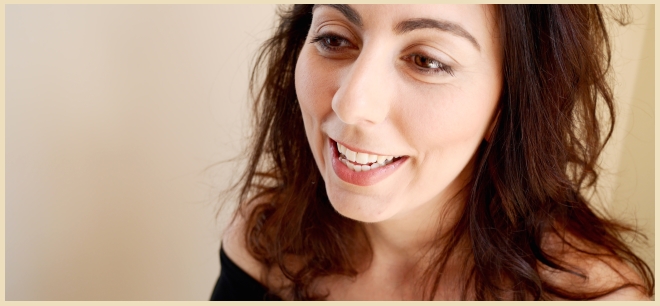Koraly Dimitriadis Interview

With her blazing collection Love & Fuck Poems now blowing minds in the wild, we interrogated the poet about self-discovery, repression, and writing poems on the loo.
Can you describe your approach to writing poetry?
Most of my poems are born from emotions I feel or experiences I have and there is an urge inside me to get it out or write it out, express what I am feeling. Some poems bounce around in my head for months because the poem isn’t ready to come out, others come very quickly. I used to blog my poetry as I wrote it but these days I keep it to myself with the hope they will be part of a book someday.
Any unusual writing habits you’d care to share?
Writing poems on my phone in the pub on the loo.
You’re writing a novel, articles, poetry and have recently written a theatre show – a Jack of all trades. If you had to pick?
That’s like getting a mother to choose one of her children. I can’t do it. And I also make films!
Poetry’s popularity seems to have faded in recent times. How can it be revived?
I don’t think it has faded at all. It’s an exciting time for poetry, if you write poetry that is accessible and that people can relate to. Our society today has evolved to people taking in information and stories in small, fast grabs. Poetry is great for that.
What’s the poetry scene like in Australia?
It’s a pretty big scene! There are sub groups, like the slam poets and the traditional poets and the spoken word poets. There is some cross-over but even though the scene is quite big, everyone kind of knows everyone, which is a good thing (I think). It’s inspiring and has a strong community feel to it.
“Society today has evolved to people taking in information and stories in small, fast grabs. Poetry’s great for that.”
How much of your writing is for you, rather than the reader?
It’s both.
When I write poetry it is to process something I am going through, to make commentary on something I have seen so I can make sense of it, or to document what has happened so I can never forget it.
Woven in with these needs is my honesty, that in order to deal with these things I have to be honest with myself. From this honesty I hope to connect with the human condition and other humans because I know that everything I feel and write about is not unique and that others experience it too, so it makes me feel less alone and more connected with humanity.
Most of your work is based on your life. In your poems and performance, you lay yourself bare. Do you ever feel uncomfortably exposed?
I guess I do but the need to express and connect with others who have experienced what I have experienced is far greater because I spent most of my life feeling isolated and misunderstood and I want to help people who also feel like this so they don’t feel so alone.
What do you gain, if anything, from the experience of being exposed?
When people approach me and tell me that my poetry helps them, that my honesty gives them courage, I feel better not only for them but it also appeases my sorrow for what happened to me. I see all my writing as political. I am trying to make a difference.
“I see all my writing as political.
I am trying to make a difference.”
Your marriage at an early age, that you felt pressured into by family and society, has been a large influence. Many people experience similar expectations to conform to cultural ideologies of some type. How responsible are we for our own lives?
I was not pressured into marriage by my family, but cultural norms placed on many women to marry are common and I lived under those norms.
I saw marriage as a “way out”, an entry into freedom, because I had a pretty strict upbringing and was not given much freedom to make my own decisions. If you are raised in an environment where you are taught fear rather than empowerment, where you are not taught how to make decisions, then you don’t know how to be responsible for your own life and it’s a struggle.
You then have to learn those skills much later in life, on your own, and by that time you may have realised you were living the life others wanted for you, not the life you wanted for yourself, which is what happened for me.
You’ve mentioned in previous interviews that when your marriage ended, it was an opportunity to find your personal and sexual identity. How important is it for you to discover who you truly are? And have you?
The reason I fled my culture and marriage was to find who I was, what I wanted, and most importantly it was to shed the fear ingrained into me by my culture, particularly that you need to have a husband so you won’t be alone. I always had this fear of being alone. It took a long time to shed that fear but when I did it liberated me.
Do we ever stop exploring who we are? I don’t think so. But I am more comfortable with my identity and that I am living the life I choose to live rather than one prescribed to me.
Repression: a normal, natural part of functioning society, or, should be avoided, always?
Avoided. People should be free to live as they choose.
What were the first and last books to blow your mind?
Loaded by Christos Tsiolkas. The Edible Woman by Margaret Atwood.












